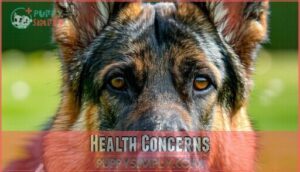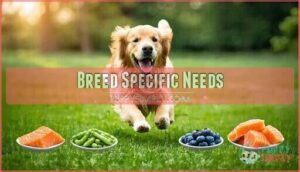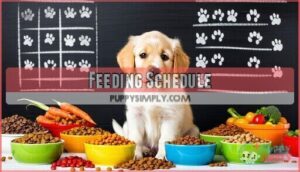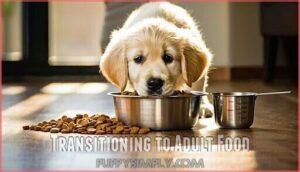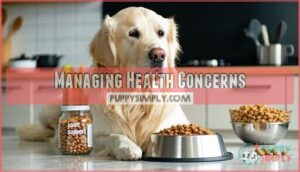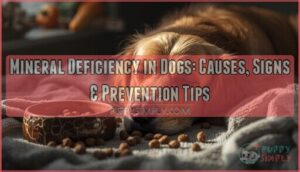This site is supported by our readers. We may earn a commission, at no cost to you, if you purchase through links.

Look for formulas containing whole grains, sweet potatoes, and added glucosamine for joint support. Avoid cheap fillers and by-products that provide empty calories.
Adult Goldens typically need 2-3 cups daily, split into two meals.
Premium brands like Wellness, Blue Buffalo, and Royal Canin offer breed-specific formulations addressing their unique needs for coat health, energy levels, and hip dysplasia prevention.
The right choice depends on your dog’s age, activity level, and any food sensitivities they might have.
Table Of Contents
- Key Takeaways
- Golden Retriever Nutrition Needs
- Choosing Best Dog Food
- Top 9 Best Dog Foods
- 1. Wellness Large Breed Dog Food
- 2. Taste Wild Southwest Canyon Dog Food
- 3. Iams Adult Large Breed Chicken
- 4. Blue Buffalo Wilderness Chicken Dog Food
- 5. Royal Canin Golden Retriever Puppy Dog Food
- 6. Eagle Pack Large Breed Adult Dog Food
- 7. Diamond Naturals Large Breed Adult Dog Food
- 8. Holistic Select Senior Chicken Lentils Dry Dog Food
- 9. Chicken Soup Soul Large Breed Dog Food
- Feeding Golden Retriever Puppies
- Managing Health Concerns
- Selecting Ideal Dog Food
- Frequently Asked Questions (FAQs)
- What is the best dog food for Golden Retrievers?
- What do Golden Retrievers eat?
- Which Golden Retriever food is best for weight loss?
- Can Golden Retrievers eat grains?
- Can Golden Retrievers eat a vegetarian diet?
- Do golden retrievers need special food?
- How much should I feed my Golden Retriever daily?
- When should Golden Retrievers switch from puppy food?
- What human foods are toxic for Golden Retrievers?
- How often should Golden Retrievers eat per day?
- Conclusion
Key Takeaways
- You’ll want at least 22-37% protein from quality sources like chicken or fish, plus glucosamine for joint support – Golden Retrievers are prone to hip dysplasia affecting up to 73% of the breed
- Feed adult Goldens 2-3 cups daily split into two meals, adjusting portions based on activity level since 63% of Golden Retrievers are overweight and need careful calorie control
- Choose breed-specific formulas from premium brands like Wellness, Blue Buffalo, or Royal Canin that address Golden Retrievers’ unique needs for coat health and cancer prevention (nearly 60% develop cancer)
- Avoid cheap fillers, by-products, and common allergens like beef, wheat, and corn – opt for limited ingredient diets if your dog shows signs of food sensitivities like itching or digestive upset
Golden Retriever Nutrition Needs
Your Golden Retriever needs high-quality protein (at least 18% for adults), essential vitamins, and balanced carbohydrates to maintain their active lifestyle and thick coat.
Proper nutrition becomes even more critical since nearly 60% of Golden Retrievers face cancer risks and over 63% struggle with weight issues that can lead to joint problems.
Smart nutrition choices can slash your Golden Retriever’s cancer and joint disease risks dramatically.
Protein Requirements
For Golden Retrievers, protein requirements vary by life stage and activity level.
Adult dogs need minimum 18% crude protein, though 20-26% supports ideal muscle maintenance.
Puppy protein requirements reach 22-30% for proper growth.
High-quality protein sources like chicken, fish, and beef provide essential amino acids while preventing taurine deficiency common in large breed food formulations.
Protein source quality is vital, as complete proteins matter for keratin production and overall health.
Vitamin and Mineral Needs
Five essential vitamins and minerals fuel your Golden Retriever’s ideal nutrition.
Vitamin A supports vision and immune function, while Vitamin D enhances mineral absorption for strong bones.
Antioxidant benefits from Vitamin E protect cells from damage, and supplement sources provide zinc for skin health and selenium for cellular protection.
This balanced diet foundation prevents common deficiencies affecting Golden Retrievers’ wellbeing, and proper nutrition supports essential metabolic functions through a balanced intake of nutrients, as seen in essential metabolic functions, which is crucial for their overall wellbeing.
Carbohydrate Sources
Complex carbs from sweet potatoes and grain alternatives like brown rice fuel your golden retriever’s active lifestyle without triggering carb intolerance.
These energy-provision powerhouses offer fiber benefits that support digestive health while avoiding problematic whole grain wheat.
Quality dog food for golden retrievers balances carbohydrates with protein, ensuring sustained energy for those daily fetch sessions your pup craves, providing a perfect blend of nutrients for their overall well-being with sustained energy.
Choosing Best Dog Food
Selecting the right dog food for your Golden Retriever requires careful consideration of protein content, ingredient quality, and your dog’s specific health needs.
You’ll need to evaluate factors like age, activity level, allergies, and potential breed-specific concerns such as joint health and heart conditions when making your choice.
Factors to Consider
When selecting golden retriever food, you’ll need to evaluate several key factors.
Life Stage determines whether your Golden Retrievers need puppy, adult, or senior nutrition formulations. Activity Level affects caloric requirements – active large breed dogs need more energy-dense dog food for Golden Retrievers.
Ingredient Quality impacts overall health outcomes. Budget Constraints influence available options.
Consider Specific Needs like allergies or joint support when choosing appropriate nutrition. Many owners buy large breed dog food for their retrievers.
Health Concerns
When choosing dog food for Golden Retrievers, you’ll face four critical health challenges that demand careful consideration.
Your Golden’s health hinges on smart nutrition choices that fight breed-specific risks.
Your golden’s well-being hinges on addressing these breed-specific vulnerabilities through targeted nutrition:
- Canine Cancer – Nearly 60% of Golden Retrievers develop cancer, making high-quality ingredients essential
- Taurine Deficiency – Can trigger Dilated Cardiomyopathy DCM, requiring animal protein-rich formulas
- Food Allergies – Common triggers include beef, dairy, and grains causing skin irritation
- Weight Management – 63% are overweight, increasing Joint Health risks and requiring portion control
Addressing food allergies is vital, as many dogs require specialized food options.
Breed Specific Needs
Golden Retrievers require breed-specific nutrition addressing their unique Coat Health needs through omega fatty acids, Activity Levels demanding higher calories, and Genetic Predispositions to cancer requiring natural ingredients.
Their large breed size necessitates joint support supplements, while their Lifespan Stage determines protein requirements.
The best dog food for Golden Retrievers must accommodate these breedspecific needs. Large breed puppies need balanced calcium-phosphorus for proper bone development, which is crucial for their overall Coat Health.
Top 9 Best Dog Foods
You’ll find nine excellent dog food options that address golden retrievers’ specific nutritional needs and common health concerns.
These selections balance high-quality protein sources, joint support ingredients, and digestibility to keep your golden retriever healthy and thriving.
1. Wellness Large Breed Dog Food
Wellness Large Breed Dog Food delivers exceptional ingredient quality with deboned chicken as the primary protein source for your Golden Retrievers.
This formula supports large breed joint health through glucosamine and chondroitin, while maintaining ideal digestibility factors with wholesome grains.
The breed suitability shines through balanced nutrition designed for active dogs, though cost analysis reveals it’s pricier than basic options.
Large breed puppy food should have a controlled calcium ratio for healthy bone growth.
2. Taste Wild Southwest Canyon Dog Food
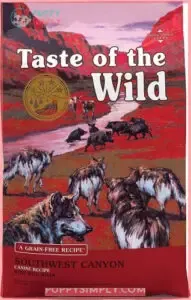
Looking beyond traditional large breed formulas, Taste of the Wild Southwest Canyon brings a unique protein-rich approach to your Golden Retriever’s nutrition.
This grain-free formula delivers exceptional value through its wild boar and lamb protein sources.
Ingredient Analysis highlights:
- Wild boar provides novel protein for sensitive dogs
- Sweet potatoes offer complex carbohydrates for sustained energy
- Probiotics support healthy digestive function
- Antioxidant-rich fruits boost immune system health
The flavor profile appeals to picky eaters while maintaining excellent digestibility for large breed requirements.
3. Iams Adult Large Breed Chicken
Consistently ranked among veterinarians’ trusted choices, this farm-raised chicken formula delivers complete nutrition without fillers.
Real chicken serves as the primary ingredient, supported by eggs for muscle development and whole grains for digestible energy.
You’ll find natural glucosamine and chondroitin supporting joint health, plus seven heart-healthy nutrients.
While some dogs experience improved coats and digestion, others may show sensitivity to corn or artificial coloring, which can impact their overall joint health.
Best For: Large breed adult dogs whose owners want a trusted, veterinarian-recommended formula with real chicken as the first ingredient and joint support benefits.
- Contains whole grain corn and artificial coloring which may cause sensitivities in some dogs
- Mixed reviews on palatability with some dogs showing pickiness or food avoidance
- Occasional reports of digestive issues like gas or soft stool, particularly during food transitions
- Real farm-raised chicken as primary ingredient with added eggs for strong muscle development in large breeds
- Contains natural glucosamine and chondroitin for joint health plus seven heart-healthy nutrients
- WSAVA-certified with complete balanced nutrition and no fillers, offering good value for the price
4. Blue Buffalo Wilderness Chicken Dog Food
You’ll find Blue Buffalo Wilderness delivers exceptional chicken quality as its first ingredient, making this grain-free dog food ideal for Golden Retrievers with sensitivities.
The ingredient analysis reveals high protein content supporting muscle development, while cost comparison shows competitive pricing for premium nutrition.
Golden Retrievers typically enjoy the palatability factors, though some dogs may need gradual introduction to this protein-rich formula.
5. Royal Canin Golden Retriever Puppy Dog Food
Royal Canin’s Breed-Specific Formula targets Golden Retriever puppy development with customized kibble size and precise nutrition.
This puppy food contains ideal protein levels supporting healthy growth while maintaining palatability that appeals to young Golden Retrievers.
Ingredient Analysis reveals quality chicken meal and rice, though some owners prefer grain-free options.
Feeding Guidelines provide clear portions based on age and weight, ensuring a healthy growth pattern for the puppies.
6. Eagle Pack Large Breed Adult Dog Food
Featuring chicken meal as its primary protein source, Eagle Pack delivers complete nutrition formulated for large breed adults.
This premium formula includes natural prebiotics and antioxidants that support digestive health and immune function in Golden Retrievers.
- Ingredient Analysis: Real chicken meal provides concentrated protein without excessive fillers
- Protein Content: 23% protein supports muscle maintenance in adult Golden Retrievers
- Digestibility Factors: Natural fiber sources promote healthy digestion and nutrient absorption
7. Diamond Naturals Large Breed Adult Dog Food
Looking beyond the flashy marketing, Diamond Naturals Large Breed Adult Dog Food delivers real value through its cage-free chicken first ingredient and wholesome whole grains.
You’ll appreciate the glucosamine and chondroitin that support your Golden’s joints, while omega fatty acids keep their coat gleaming.
The formula includes superfoods like blueberries and sweet potatoes for antioxidant support.
With 80 million CFU probiotics per pound, your dog’s digestive health stays on track.
This American-made food avoids corn, wheat, and artificial additives that trigger allergies.
Best For: Golden Retriever owners seeking a joint-supportive, American-made large breed formula with probiotics and superfoods at moderate pricing.
- Contains glucosamine and chondroitin specifically for large breed joint health
- Features 80 million CFU probiotics per pound plus superfoods like blueberries for digestive and immune support
- Made in USA without corn, wheat, or artificial additives that commonly trigger allergies
- Larger kibble size may not suit smaller dogs or puppies in multi-dog households
- Contains multiple grains which some dogs with grain sensitivities may not tolerate well
- Moderate protein content at 22-23% may be insufficient for highly active or working dogs
8. Holistic Select Senior Chicken Lentils Dry Dog Food
As your Golden Retriever enters their golden years, Holistic Select Senior Chicken Lentils provides targeted Senior Nutrition designed specifically for aging dogs.
This formula combines high-quality Chicken Quality protein with nutrient-dense lentils to support your senior dog’s changing needs.
Key Benefits for Senior Golden Retrievers:
- Enhanced Digestibility Factors – easily absorbed proteins support aging digestive systems
- Lentil Benefits – provide fiber and plant-based protein for sustained energy
- Holistic Ingredients – whole food components support overall wellness
- Joint support – glucosamine and chondroitin maintain mobility
- Cognitive health – antioxidants support brain function in senior dogs
9. Chicken Soup Soul Large Breed Dog Food
Chicken Soup for the Soul Large Breed dog food delivers solid nutrition through real chicken and wholesome ingredients.
You’ll find adequate protein content supporting Golden Retrievers’ muscle development, while the recipe includes beneficial vegetables and grains for digestibility.
The ingredient quality remains consistent, though palatability varies among dogs, and cost analysis shows this option fits mid-range budgets for large breed formulations.
Feeding Golden Retriever Puppies
Your Golden Retriever puppy needs at least 22% protein and 8% fat to support rapid growth and development during their first year.
You’ll start with four meals daily at 8 weeks, gradually reducing to twice daily by 6 months, then switch to adult food around 12-18 months when growth plates close.
Nutritional Requirements
Growing puppies need specialized nutrition that’s different from adult Golden Retrievers.
Your puppy’s rapidly developing body requires higher protein content and specific nutrient ratios to support healthy growth. Many owners find it convenient to buy specialized food for their Golden Retriever puppy.
- Protein Sources: Aim for 30% protein from chicken, lamb, or fish to build strong muscles
- Healthy Fats: Include 8% fat content for brain development and energy needs
- Vitamin Intake: Provide adequate vitamins A, D, and B-complex for proper growth
- Mineral Balance: Provide calcium and phosphorus for bone development and joint health
Feeding Schedule
Proper feeding schedules support healthy growth patterns in Golden Retriever puppies.
Adult Portions aren’t suitable for growing pups who need frequent meals to maintain steady energy levels and prevent digestive upset.
| Age | Meals Per Day | Portion Size | Activity Levels | Treat Timing |
|---|---|---|---|---|
| 8-12 weeks | 4 meals | 1/2 cup each | Light play | Between meals |
| 3-6 months | 3 meals | 3/4 cup each | Moderate exercise | Training rewards |
| 6-12 months | 2-3 meals | 1-1.5 cups each | Active play | Post-exercise |
| 12+ months | 2 meals | Adult Portions | Full activity | Structured times |
| Senior (7+ years) | 2 meals | Senior Adjustments | Reduced activity | Limited treats |
Puppy Schedules work best when you feed at consistent times – typically morning, midday, and evening.
This routine helps with housetraining and prevents overeating.
Large breed puppies like Golden Retrievers benefit from controlled feeding rather than free-feeding, which can lead to rapid growth spurts that stress developing joints.
Monitor your pup’s body condition and adjust portions based on their individual needs and veterinary guidance.
Transitioning to Adult Food
Most puppies are ready to switch from puppy food to adult dog food for Golden Retrievers between 12-18 months.
Start the gradual food change by mixing 25% adult food with 75% puppy food, then slowly adjust ratios over seven days.
Monitor dog health closely while adjusting food type, watching for digestive upset.
Adult portion sizes differ substantially from large breed puppy requirements, so follow your vet’s nutrition guidelines throughout this critical puppy food timeline.
Managing Health Concerns
Golden Retrievers face three major health challenges that proper nutrition can help manage: joint problems, food allergies, and weight gain.
You’ll need to choose dog food that supports joint health, avoids common allergens, and provides precise portion control to keep your Golden healthy throughout their life, which can help manage issues like food allergies.
Hip and Joint Issues
Golden Retrievers face significant joint challenges, with hip dysplasia affecting up to 73% of the breed.
Weight management plays a key role in reducing joint stress. Look for dog food containing glucosamine and chondroitin sulfate – these joint supplements support cartilage repair.
Omega-3 fatty acids from fish oil provide anti-inflammatory benefits. Choose large-breed formulas with glucosamine benefits already built in. Exercise impact matters too, so maintain healthy weight through proper portion control.
Allergies and Sensitivities
Managing food allergies in Golden Retrievers requires careful attention to symptoms and dietary adjustments.
These dogs frequently develop protein intolerance and grain allergies, leading to skin irritation and digestive upset that can substantially impact their quality of life.
- Common triggers: Beef, chicken, wheat, corn, and soy cause most food allergies in Golden Retrievers
- Watch for signs: Chronic ear infections, excessive scratching, diarrhea, and hot spots indicate sensitivities
- Limited ingredient diets: Novel proteins like duck or salmon help identify specific allergens
- Environmental factors: Pollen and dust can worsen food-related skin irritation and digestive upset
Obesity and Weight Management
Nearly 63% of Golden Retrievers are overweight, making calorie control and portion sizes essential for the best dog food choices.
Weight monitoring helps prevent diabetes and joint problems. Regular exercise paired with healthy treats keeps your dog trim.
Active Golden Retrievers maintain healthy weight 74% more often than sedentary ones, proving exercise importance in obesity prevention and overall weight management.
Selecting Ideal Dog Food
Finding the perfect dog food for your Golden Retriever requires understanding their unique dietary needs and potential health sensitivities.
You’ll want to focus on three key areas: grain-free options for dogs with sensitivities, limited ingredient formulas for allergic pups, and proper vitamin supplementation to support their active lifestyle.
Grain-Free Diets
Anyone considering grainfree dog food for their Golden Retriever should weigh both benefits and potential risks.
While these diets offer allergy relief for dogs sensitive to wheat, corn, or barley, they don’t guarantee better digestion concerns for all pets.
Many owners are also exploring vegetarian dog food options for their pets.
Key considerations for grainfree diets:
- Ingredient Quality – Premium proteins replace grains
- Cost Comparison – Typically 20-30% more expensive
- Grain-Free Benefits – Reduced dog allergies symptoms
- Digestion Concerns – May increase legume content
Golden Retrievers with confirmed grain sensitivities benefit most from grainfree diets.
Limited Ingredient Diets
Limited ingredient diets help Golden Retrievers with food allergies by reducing potential triggers.
These formulas focus on novel proteins like duck or venison with single carbohydrate sources.
When your dog shows allergy symptoms like itching or digestive upset, diet elimination becomes your detective work.
Ingredient sourcing matters—choose brands that clearly list components.
Limited ingredient options support skin health while identifying problematic foods through systematic testing, using limited ingredient diets and focusing on single carbohydrate sources.
Supplementing With Vitamins and Minerals
While selecting dog food addresses basic nutrition, many Golden Retrievers benefit from targeted supplementation.
Vitamin Absorption improves when you time supplements with meals, helping your dog utilize nutrients effectively.
Mineral Deficiency signs include poor coat quality and low energy levels.
Follow Dosage Guidelines carefully—excess vitamins can harm your pet.
Natural supplements often provide better bioavailability than Synthetic vs. Natural alternatives, supporting ideal nutrition for Golden Retrievers, with improved Vitamin Absorption.
Frequently Asked Questions (FAQs)
What is the best dog food for Golden Retrievers?
Purina Pro Plan Large Breed stands out as the top choice, featuring chicken as the primary ingredient and meeting Golden Retrievers’ specific nutritional needs for peak health.
What do Golden Retrievers eat?
Golden Retrievers need high-quality dog food with at least 18% protein from sources like chicken, beef, or salmon.
They’ll thrive on balanced diets including healthy fats, complex carbohydrates, vitamins, and minerals to support their active lifestyle.
Which Golden Retriever food is best for weight loss?
For weight management, you’ll want high-protein, lower-calorie foods with fiber to help your golden feel full.
Look for formulas specifically designed for weight control or large breed dogs with reduced fat content.
Can Golden Retrievers eat grains?
Coincidentally, while you’re exploring weight loss options, grains can actually be part of your Golden’s healthy diet.
Despite grain-free trends, whole grains like brown rice and oats provide beneficial fiber and energy for active Golden Retrievers, making whole grains a valuable component.
Can Golden Retrievers eat a vegetarian diet?
Dogs aren’t built for vegetarian diets – they need animal protein for essential amino acids like taurine.
Without meat, you’ll risk serious health problems including heart disease and muscle loss in your golden retriever.
Do golden retrievers need special food?
Like finding the perfect puzzle piece, you’ll want breed-specific nutrition for your golden retriever.
They don’t need special food, but benefit from large-breed formulas supporting joint health and managing their cancer predisposition.
How much should I feed my Golden Retriever daily?
Feed your Golden Retriever 1,000-1,300 calories daily if they’re inactive, or 1,350-1,750 calories for active dogs. Adjust portions based on age, weight, and activity level to prevent obesity.
When should Golden Retrievers switch from puppy food?
Your golden retriever’s puppy-to-adult food shift shouldn’t be rushed—timing this nutritional milestone perfectly prevents devastating growth issues.
Switch between 12-18 months when growth plates close, ensuring proper bone development and preventing joint problems.
What human foods are toxic for Golden Retrievers?
Never give your Golden Retriever chocolate, grapes, raisins, onions, garlic, xylitol (artificial sweetener), avocado, macadamia nuts, or alcohol. These foods cause serious poisoning, organ damage, or death in dogs.
How often should Golden Retrievers eat per day?
How often should you serve meals to keep your furry friend healthy and happy?
Adult Golden Retrievers thrive on twice-daily feeding schedules—morning and evening meals spaced 8-12 hours apart support ideal digestion and prevent bloating.
Conclusion
Choosing carefully crafted cuisine for your canine companion guarantees a healthy and happy life.
The best dog food for golden retrievers contains high-quality protein, essential fatty acids, and joint-supporting nutrients.
Consider your Golden’s age, activity level, and health needs when selecting from these premium options.
Quality ingredients cost more upfront but prevent expensive health issues later.
Feed measured portions twice daily and monitor your dog’s weight regularly.
Remember, proper nutrition forms the foundation for your Golden Retriever’s long, healthy life.
- https://supertails.com/pages/golden-retriever
- https://evangersdogfood.com/nutritional-tips-for-golden-retrievers/
- https://www.petful.com/food/best-dog-food-for-golden-retrievers/
- https://www.youtube.com/watch?v=O0QKnN8Sg10
- https://www.reddit.com/r/goldenretrievers/comments/1fbz6cc/what_dog_food_do_you_give_your_golden/


